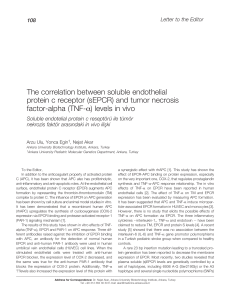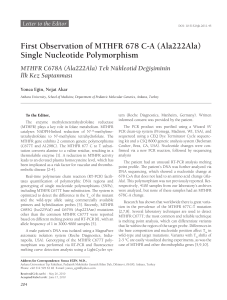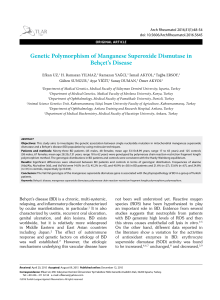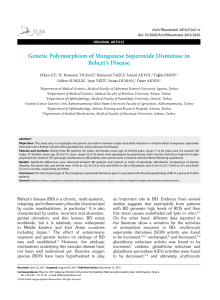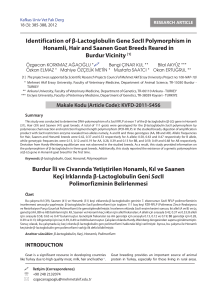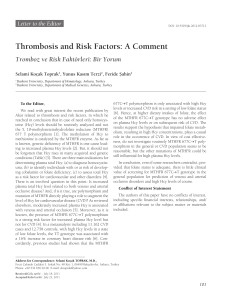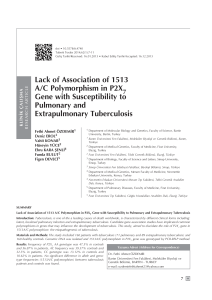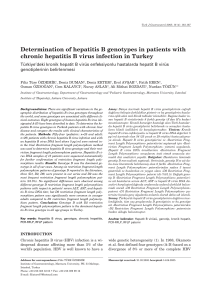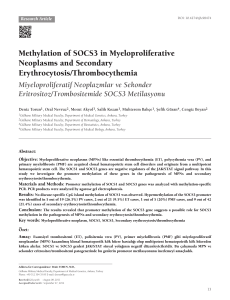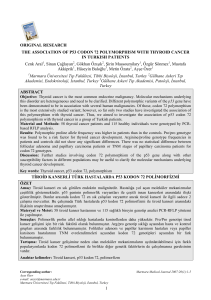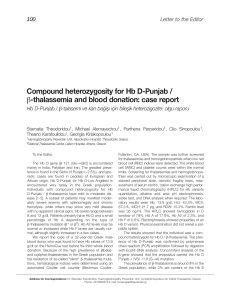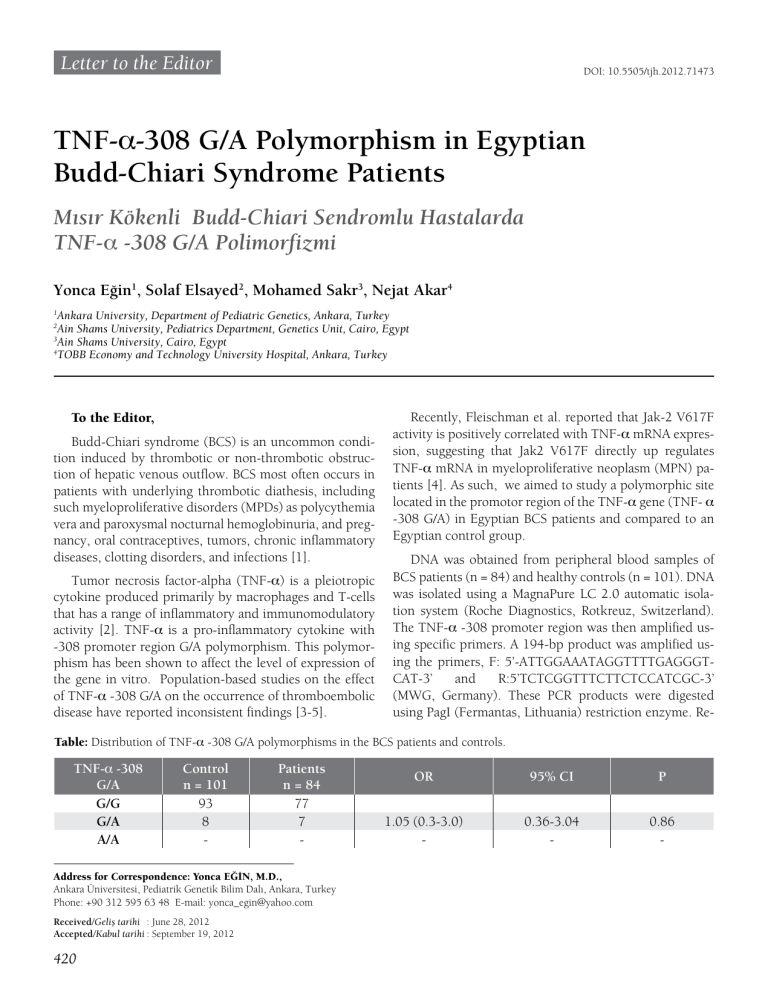
Letter to the Editor
DOI: 10.5505/tjh.2012.71473
TNF-α-308 G/A Polymorphism in Egyptian
Budd-Chiari Syndrome Patients
Mısır Kökenli Budd-Chiari Sendromlu Hastalarda
TNF-α -308 G/A Polimorfizmi
Yonca Eğin1, Solaf Elsayed2, Mohamed Sakr3, Nejat Akar4
Ankara University, Department of Pediatric Genetics, Ankara, Turkey
Ain Shams University, Pediatrics Department, Genetics Unit, Cairo, Egypt
3
Ain Shams University, Cairo, Egypt
4
TOBB Economy and Technology University Hospital, Ankara, Turkey
1
2
To the Editor,
Budd-Chiari syndrome (BCS) is an uncommon condition induced by thrombotic or non-thrombotic obstruction of hepatic venous outflow. BCS most often occurs in
patients with underlying thrombotic diathesis, including
such myeloproliferative disorders (MPDs) as polycythemia
vera and paroxysmal nocturnal hemoglobinuria, and pregnancy, oral contraceptives, tumors, chronic inflammatory
diseases, clotting disorders, and infections [1].
Tumor necrosis factor-alpha (TNF-α) is a pleiotropic
cytokine produced primarily by macrophages and T-cells
that has a range of inflammatory and immunomodulatory
activity [2]. TNF-α is a pro-inflammatory cytokine with
-308 promoter region G/A polymorphism. This polymorphism has been shown to affect the level of expression of
the gene in vitro. Population-based studies on the effect
of TNF-α -308 G/A on the occurrence of thromboembolic
disease have reported inconsistent findings [3-5].
Recently, Fleischman et al. reported that Jak-2 V617F
activity is positively correlated with TNF-α mRNA expression, suggesting that Jak2 V617F directly up regulates
TNF-α mRNA in myeloproliferative neoplasm (MPN) patients [4]. As such, we aimed to study a polymorphic site
located in the promotor region of the TNF-α gene (TNF- α
-308 G/A) in Egyptian BCS patients and compared to an
Egyptian control group.
DNA was obtained from peripheral blood samples of
BCS patients (n = 84) and healthy controls (n = 101). DNA
was isolated using a MagnaPure LC 2.0 automatic isolation system (Roche Diagnostics, Rotkreuz, Switzerland).
The TNF-α -308 promoter region was then amplified using specific primers. A 194-bp product was amplified using the primers, F: 5’-ATTGGAAATAGGTTTTGAGGGTCAT-3’
and
R:5’TCTCGGTTTCTTCTCCATCGC-3’
(MWG, Germany). These PCR products were digested
using PagI (Fermantas, Lithuania) restriction enzyme. Re-
Table: Distribution of TNF-α -308 G/A polymorphisms in the BCS patients and controls.
TNF-α -308
G/A
G/G
G/A
A/A
Control
n­= 101
93
8
-
Patients
n = 84
77
7
-
Address for Correspondence: Yonca EĞİN, M.D.,
Ankara Üniversitesi, Pediatrik Genetik Bilim Dalı, Ankara, Turkey
Phone: +90 312 595 63 48 E-mail: yonca_egin@yahoo.com
Received/Geliş tarihi : June 28, 2012
Accepted/Kabul tarihi: September 19, 2012
420
OR
95% CI
P
1.05 (0.3-3.0)
-
0.36-3.04
-
0.86
-
Turk J Hematol 2012; 29: 420-421
Yonca E, et al: TNF-α-308 G/A Polymorphism in Egyptian Budd-Chiari Syndrome Patients
stricted fragments were run on 3% agarose gel and viewed
under UV light [3].
Among the 84 BCS patients, TNF-α -308 G/A polymorphism was present in 8.3% (n = 7), whereas the frequency of TNF-α -308 G/A polymorphism in the healthy
Egyptian controls was 7.9%. The distribution of TNF-α
-308 G/A polymorphisms in the BCS patients and controls
is shown in the Table.
Fleischman et al. reported that TNF-α plays a central role in promoting clonal dominance of Jak2 V617Fexpressing cells in MPN. They showed that Jak2 V617F
kinase regulates TNF-α expression in cell lines and primary MPN cells, and that TNF-α expression is correlated
with Jak2 V617F allele burden [4]. Ghaffar et al. recently
reported that factor V Leiden (FVL) was a major etiological factor associated with thrombosis in Egyptian BCS patients, as compared to the frequency of FVL in the general
Egyptian population, [6,7]. Elevated TNF-α might be associated with an increase in the risk of thrombotic complications due to the effect of this cytokine on the endothelium. The frequency of TNF-α -308 G/A polymorphism
did not differ between Egyptian BCS patients and healthy
controls in the present study.
Conflict of Interest Statement
None of the authors have any conflicts of interest, including specific financial interests, relationships, and/or
affiliations, relevant to the subject matter or materials included.
References
1. Shetty S, Ghosh K. Thrombophilic dimension of Budd chiari
syndrome and portal venous thrombosis-a concise review.
Thromb Res 2011; 127:505-512.
2. Allen RD. Polymorphism of the human TNF-alpha
promoter-random variation or functional diversity? Mol
Immunol 1999; 36:1017-1027.
3. Akar N, Hasipek M. Tumour Necrosis Factor-Alpha Gene
Polymorphism (-308 G-A) in Turkish Pediatric Thrombosis
Patients. Turk J Hematol 2002; 19:39-41.
4. Fleischman AG, Aichberger KJ, Luty SB, Bumm TG,
Petersen CL, Doratotaj S, Vasudevan KB, Latocha DH, Yang
F, Press RD, Loriaux MM, Pahl HL, Silver RT, Agarwal A,
O’Hare T, Druker BJ, Bagby GC, Deininger MW. TNFα
facilitates clonal expansion of JAK2V617F positive cells in
myeloproliferative neoplasms. Blood 2011; 118:6392-6398.
5. Elahi MM, Asotra K, Matata BM, Mastana SS. Tumor necrosis
factor alpha -308 gene locus promoter polymorphism: An
analysis of association with health and disease. Biochim
Biophys Acta 2009; 1792:163-172.
6. Abdel Ghaffar TY, Elsayed SM, Sakr MA, Elsobky ES,
Abdelhakam SM Yousuf S, Eğin Y, Akar N. Factor V G1691A
(Leiden) is a major etiological factor in Egyptian BuddChiari syndrome patients. Turk J Hematol 2011; 28:299305
7. Ulu A, Elsobky E, Elsayed M, Yıldız Z, Tekin M, Akar N.
Frequency of five thrombophilic polymorphisms in the
Egyptian population. Turk J Hematol 2006; 23:100-103
421

